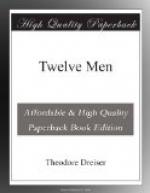Nor do I know how he achieved these friendships, such as they were. I was never with him when he did. But aside from the satiation they afforded his taste for the strange and picturesque, I am sure they reflected no gross or sensual appetite. But I wish to attest in passing that the mere witnessing of these free scenes had a tonic as well as toxic effect on me. As I view myself now, I was a poor, spindling, prying fish, anxious to know life, and yet because of my very narrow training very fearsome of it, of what it might do to me, what dreadful contagion of thought or deed it might open me to! Peter was not so. To him all, positively all, life was good. It was a fascinating spectacle, to be studied or observed and rejoiced in as a spectacle. When I look back now on the shabby, poorly-lighted, low-ceiled room to which he led me “for fun,” the absolutely black or brown girls with their white teeth and shiny eyes, the unexplainable, unintelligible love of rhythm and the dance displayed, the beating of a drum, the sinuous, winding motions of the body, I am grateful to him. He released my mind, broadened my view, lengthened my perspective. For as I sat with him, watching him beat his drum or play his flute, noted the gayety, his love of color and effect, and feeling myself low, a criminal, disgraced, the while I was staring with all my sight and enjoying it intensely, I realized that I was dealing with a man who was “bigger” than I was in many respects, saner, really more wholesome. I was a moral coward, and he was not losing his life and desires through fear—which the majority of us do. He was strong, vital, unafraid, and he made me so.
But, lest I seem to make him low or impossible to those who instinctively cannot accept life beyond the range of their own little routine world, let me hasten to his other aspects. He was not low but simple, brilliant and varied in his tastes. America and its point of view, religious and otherwise, was simply amusing to him, not to be taken seriously. He loved to contemplate man at his mysteries, rituals, secret schools. He loved better yet ancient history, medieval inanities and atrocities—a most singular, curious and wonderful mind. Already at this age he knew many historians and scientists (their work), a most astonishing and illuminating list to me—Maspero, Froude, Huxley, Darwin, Wallace, Rawlinson, Froissart, Hallam, Taine, Avebury! The list of painters, sculptors and architects with whose work he was familiar and books about whom or illustrated by whom he knew, is too long to be given here. His chief interest, in so far as I could make out, in these opening days, was Egyptology and the study of things natural and primeval—all the wonders of a natural, groping, savage world.
“Dreiser,” he exclaimed once with gusto, his bright beady eyes gleaming with an immense human warmth, “you haven’t the slightest idea of the fascination of some of the old beliefs. Do you know the significance of a scarab in Egyptian religious worship, for instance?”




